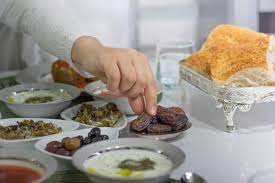Ramadan, the ninth month in Islam's calendar year, holds immense spiritual and communal importance for Muslims everywhere - providing an opportunity for deep reflection, devotion, and shared celebration. Beyond fasting alone, this month-long commemoration involves numerous regional and cultural customs, observed worldwide during this special celebration of spiritual introspection and devotion. This blog post by New Arabia will highlight “What are Ramadan Traditions?”
Fasting (Sawm) Is at the Core of Ramadan
One of the cornerstones of Ramadan for Muslims, fasting is at its heart. Muslims will forgo food and beverages each day between dawn and dusk to promote disciplined self-reliance, and compassion toward less privileged members of society, and strengthen religious bonds.
Suhoor and Iftar: Bookends of the Fast
Suhoor, also known as morning prayer breakfast is an integral component of Muslim fasting practices. Muslims typically wake before sunrise for this light yet nutritious breakfast consisting of dates, fruits, water, or juice to sustain them through their fast. At sunset families and communities come together at Iftar for storytelling, strengthening bonds, thanking each other for life experiences shared, and showing thanksgiving for one another's lives.
Thobes and Prayer Garments: Embracing Modesty
Muslims observe Ramadan with reverent attire to show respect during this holy month, often wearing loose-fitting clothing known as Thobes from Middle Eastern or South Asian backgrounds as part of Islamic dress code principles that encourage modest attire for men as well as modest clothing for women who abide by Islamic dress codes promoting modest dress. Browse Thobes UK online where various styles and fabrics tailored specifically for you await!
Ramadan Goes Beyond Fasting to Foster Spiritual Development
Ramadan is more than physical deprivation: Muslims devote extra time to prayer, Quran reading, and charity during this sacred month. Each night prayer known as Taraweeh held shortly after Isha in mosques during Ramadan offers an opportunity for increased devotion and reflection. Muslims also strive to recite all or part of Islam's sacred text - the Quran - either completely or partly during Ramadan.
Charity and Zakat: Sharing Blessings
One of Islam's five pillars, Zakat encourages Muslims to increase their charitable giving during Ramadan - helping those most in need and emphasizing kindness as part of social responsibility initiatives.
At Eid al-Fitr - we commemorate Ramadan's end!
When Ramadan concludes on Eid al-Fitr - or "the Festival of Breaking the Fast," families and friends come together in celebration, gathering around celebratory meals, visiting one another, and exchanging greetings of thanks and forgiveness with one another; an occasion that represents joyous gatherings focused around gratitude, generosity, and forgiveness - much like what Ramadan itself represents!
Eid al-Fitr is marked by joyful community gatherings and festive delights that include traditional dishes, festive decorations, and delightful celebrations - wearing new clothing symbolizes a fresh start!



